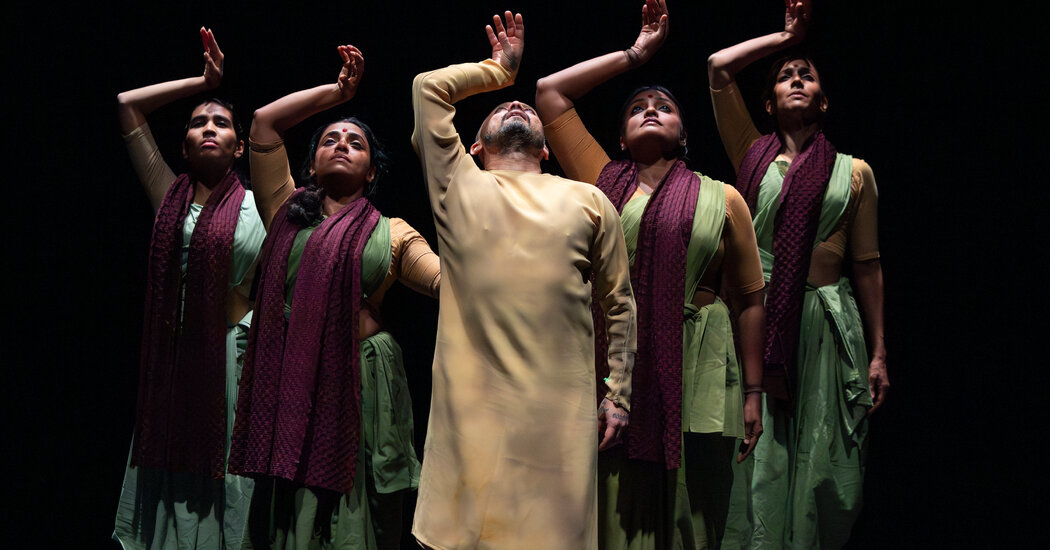Like many bold artists, British choreographer Akram Khan can confuse the affect with the magnitude. His opera productions usually undergo from swelling. Even when he had no private ties with the Indian epic, the Mahabharata – he appeared within the manufacturing of Peter Brooke’s mammoth whereas a youngster – the subject can tempt him of his massive dimension.
And but ‘Gigenis: the generation of the earth“His adaptation of a 2024 storyline from the Mahabharata is residence -based, becoming properly on the stage of Joyce’s theater, the place on Wednesday he premiered america. Impressed by the gandhary story, a mom who loses her 100 sons in an epic dimension battle, the work decreases the variety of a pair resembling Cain and Abel, illuminating the centuries -old subjects of seduction of energy and the cyclical nature of violence, focusing tightly on the mom And her grief. This has been Khan’s strongest efforts for years.
That is additionally a welcome return to his roots within the Indian traditional dance. Han, who’s learning in Catak as a younger man, has gathered knowledgeable dancers and musicians in different traditional varieties, reminiscent of Bharatanatiam and Odysi. Choreography is collective and hybrid. Han serves as a director and performs one of many sons.
The star is Capila Venu, who performs the determine of the mom. The story is informed from its viewpoint, in reminiscence, after the worst occurred, as in Martha Graham’s fashionable dance of Oedipus and Oresteya. She silently remembers her youth and courtship, the dying of her husband and the murderous rivalry of her sons, as these episodes are accepted by the opposite six dancers.
Venu is a grasp of kutiyattam, an historical type of storytelling, which normally consists of extremely complicated make-up and costumes. Right here she is devoid of those theatrical devices. It does not matter. In an early, tone of solo, it causes violence as an elementary force-cut and stabbing invisible enemies, slicing its personal throat. In some way she seems swelling, just like the unimaginable Hulk. Her eyes swell, their whites widen, their college students shrink. It is horrifying.
It’s also tragic as it’s a sufferer of violence. Scenes from her previous stream, to one another, with elegant transitions, as Venu displays each dancer who takes his place. The story, easier and doubtlessly complicated than in Graham or pure Indian traditional varieties, is impeccably clear.
The younger Odyssey dancer Sirikali adkoli embodies the lady’s flirting innocence. Renjith Babu, as her husband, the King, joins the Vijna Vasudevan in a delicate wavy love duet that introduces a choreographic motif of fingers intertwined to type a chook in flight. Han and Mavin Kho clung to Mitilli Prakash within the scene of mom and blue, which is without delay candy and premonition. They play with the concept of inheritance, passing across the invisible crown invested with your entire corrosive bait of the ring of energy.
Khan is very good right here, disappearing within the rivalry of the brothers and the greed for the advantage of his mom. Grabbing the crown, it rotates at a velocity that’s each boyish and ominous. Prakash additionally reveals energy; As she holds the invisible crown in a light-weight shaft, her throbbing fingers make us see how fascinating it’s, but additionally how irregular it jumps, the way it will get out of it.
After the king died, the play time ended and the sons struggle over the crown till one kills the opposite. On a regular basis, the motion periodically strikes away from a smooth, calm female voice of the story. “The opposite method,” “I used to be a daughter, then a spouse, then a mom.” Not solely at one other time, however “a number of occasions”. Many times, the homicide and the homicide are repeated. “And once more, I am alone.”
All that is strengthened by the end result, each unique and conventional, and stage musicians, glorious, albeit exceeding. The tunes float on tunes, and drummers launch an irresistible impulse. Nina Harris, on a double bass, accompanies a cheerful motherhood scene with a sinister sliding round, suggesting the primary grief and roar of the plane engines.
This can be a reminder of the battle, as is the storms of leaping and the sound of bombs, as they hear from a shelter. Many times the present rises to the mine, solely to freeze in a sudden silence. Gigenis is linked to cycles, however this impact feels an excessive amount of.
Usually, nonetheless, Khan’s tendency to inflate appears to have been subjected to a classical self-discipline. The patties and the pressured completely happy endings of a lot of his work are absent, changed by a tragic sense of life. “This isn’t a battle,” says the narrator. “That is the tip of the world.” As at all times.
Gigenis
Sunday at Joyce Theater in Manhattan, Joyce.orgS

